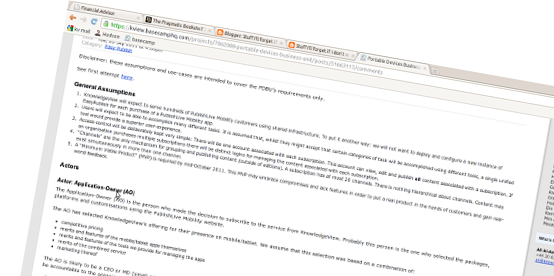On 'Flow' and feeling productive
I like to feel productive. Actually that's a huge understatement. If I'm not feeling productive I get quite unhappy. For me feeling productive goes hand in hand with creative output - something that produces a tangible artifact - and I find it difficult to satisfy my need for productivity with intangible things like meetings.
Even more than that, I need to be deeply involved in the creative activity - part of the group doing the creative stuff rather than managing it from a distance.
This post has been brewing for a while, and I finally began composing it last week. At the weekend I ran out of Kindle-fodder and bought @ericries 's new book The Lean Startup, and was amazed and pleased to hit upon the following quote, which said it all much better than I could:
Now I agree with almost all of that quote, except for the last sentence where I think the word "learning" is in some ways not fitting. I think Eric meant to encompass questions, process, meetings, and many other things in "learning", in which case I'd agree with him, but there certain kinds of "learning" which I find very productive.
Recently I've been exploring some new avenues in my work - straying away from spending all day coding and venturing into developing product ideas. At first it felt very uncomfortable and I didn't feel at all productive. Lately though I'm coming around to it.
For me part of the way through has been to find ways to turn what I'm thinking and doing into tangible artifacts that require some creative effort to produce - for example: drawing UI wireframes, writing up meetings and brainstorming sessions, and developing ideas in essay form.
By committing &ideas to disk I've started to feel productive again. Perhaps its just a safety blanket really, but it feels good, and the best bit is that with each new artifact, essay, description, and wireframe I can link to previous artifacts for reference, backup or explanation (all are available online in our basecamp account), and the conversation gets richer.

I've begun to wonder if some of my feeling of productivity actually comes from spending a certain amount of time each day in a state of flow), and if I don't get to spend some time each day in that state then I feel less happy and productive.
There are a few activities - mostly creative in some way - during which I find myself zoning out and really getting immersed in what i'm doing: coding; drawing; reading (novels); and - with a bit of effort - writing. Once i'm tuned out I can go on for hours without feeling time passing.
When I'm coding at home, with no distractions, I'll sit at the table in morning when my wife leaves for work and will hardly have moved by the time she comes home. I've noticed that I even realize, sometimes, that i'm in this state and have a "lucid flow" moment akin to lucid dreaming. Usually I get this when I hit a turning point in my work: when I've been working on a problem for a couple of hours and finally feel the complete shape of the solution in my head - I'm as deep into the problem as I'm going to get, I can start unwinding the mental stack, and from here on in progress is going to get quicker and quicker. Love that feeling.
|
Coding is the creative activity that I spend most time on, so its also the activity that most often gets me into flow, but I find the most powerful activity for flow is drawing. I suspect this has a lot to do with the difference between coding and drawing - the fact that coding requires the language centres of the brain to be active. Betty Edwards has quite a bit to say on this in Drawing on the Right Side of the Brain, which is an interesting read if you can draw reasonably well, but presumably a revelation if you've never been able to draw. |

|


